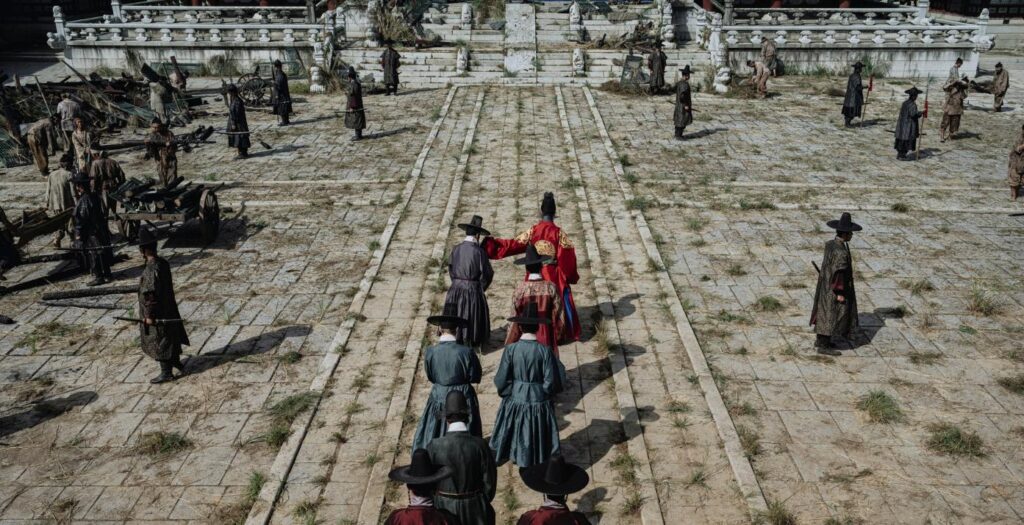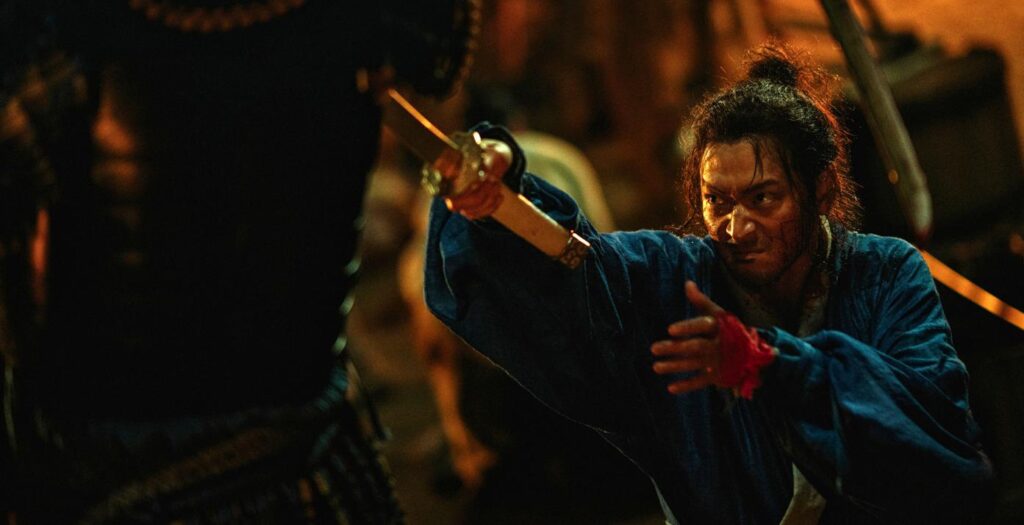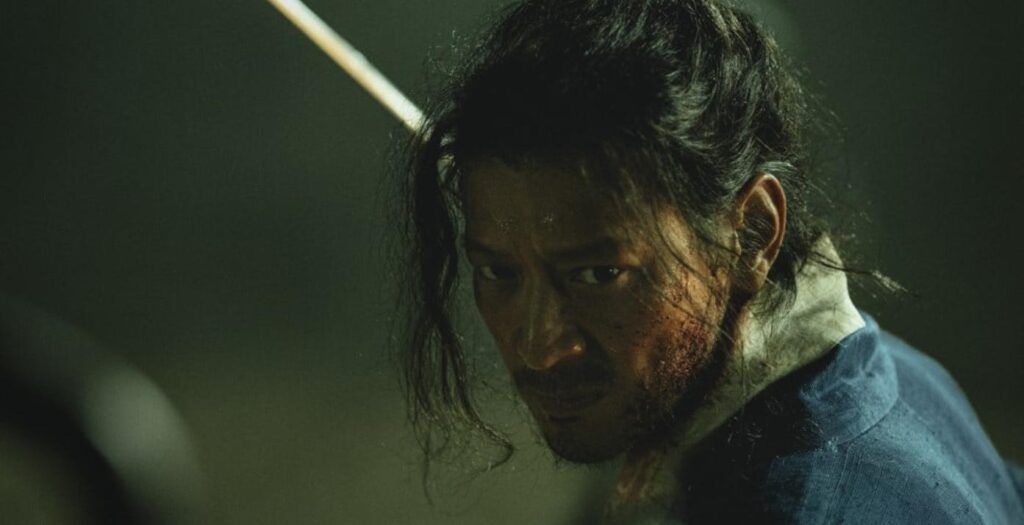I have seen my fair share of sageuk stories, Korean films, and dramas about the Joseon Dynasty. With many period films showcasing great battles, people, and the inequity wrought by royalty, and each film is varied—especially when genre flare is added in; add Kingdom to your watchlist if you haven’t already. Uprising (2024) uses many of the tropes and perspectives we’ve seen before but pulls everything together in a unique format that captures the macro and micro at the same time.
Directed by Sang-man Kim and written by Park Chan-wook, Shin Chul, director Kim, and Jahye Lee, the film stars Gang Dong-won, Park Jeong-min, Kim Shin-rock, Jung Sung-il, and Ko Han-min. Set against the chaos of war, Uprising (2024) uses two childhood friends, Cheon-yeong (Gang Dong-won) and Jong-ryeo (Park Jeong-min), who are restricted by their social standing and gradually turn into enemies.
Cheon-yeong has struggled all his life to escape slavery since he was taken from his father by Jong-ryeo’s father, with a keen eye for memorizing fighting techniques, which he leans on, exchanging his sword for the ability to be free, whether by teaching Jong-Ryeo or giving his life to Joseon in the war against the Japanese.
On the other hand, Jong-ryeo struggles to hone his swordsmanship despite being the only son of Joseon’s most prestigious military family. Still, he shares his friendship with Cheon-yeong despite his father’s constant pressure to see his best friend as no more than a slave. When Cheon-yeong passes the military qualifying exam on his friend’s behalf, Jong-ryeo tries to convince his father to release Cheon-yeong from servitude. Instead, the two remain on opposite ends of life, with Cheon-yeong’s patience now nonexistent and only rage left where brotherly love once was.
However, this personal relationship is set against the backdrop of 1592, when King Seon-jo (Cha Seung-won) flees the capital of Joseon as the Japanese army inches closer over the sea. When the war with Japan breaks out, Cheon-yeong runs away and joins the righteous army amid a chaotic power vacuum left by the King’s cowardice. As the masses turn on every noble and burn the capital to the ground, two wars are happening. A revolt by the people in Joseon against royalty and noblemen, and the Joseon people against Japan.
Open rebellion lays the foundation for Cheon-yeong’s heroism.

Cheon-yeong aims to keep his people and country safe with Jeong-ryeo’s sword and blue jobok. The central figure of Uprising (2024), Cheon-yeong, transforms from slave to folkloric hero for his people and demon for the Japanese, thanks to his unparalleled military acumen and adaptability on the battlefield over seven years.
For his part, Jeong-ryeo holds rage and revenge in his heart. When he finally returns to a devastated Joseon with the King, he is even more ingrained in serving royalty. More importantly, he has not left wanting to avoid his family, which he believes Cheon-yeong ruthlessly killed.
The two men carry their own grudges but also showcase the people fighting against royalty. Uprising (2024)’s action sequences start small and become as expansive as the conflict the story begins to showcase. Spun around an intimate tale of inequality and friendship, the focus shifts from the micro to the macro as the stakes and realities come into stark focus. By balancing the story of two men against the entirety of Joseon inequity, Uprising creates personal investment as a tether before creating a sweeping historical narrative.
The action sequences follow the same trajectory. They start as simple sparring sessions, and ones with consequences, where Cheon-yeong takes the beating intended for Jong-ryeo’s mistake. Then they become teacher and student, despite Cheon-yeong being Jong-ryeo’s slave. This hypocritical relationship that the two call friendship is meaningful, and within the larger context of the first Japanese Invasion, it shines a microscope on how classism prevails even when unintended.
As we enter the second and third acts of the film, the action sequences switch to larger multi-person battles, but the filmmakers always bring them back to focus on something smaller: a duel. In those moments, we see the reality of history. Joseon royalty fought against those who were oppressed and enslaved, and all Joseon people fought against the encroaching Japanese army. The film’s final fight is gorgeous, vulnerable, and dynamic, and brings every story thread into three people fighting, their swords drawn, their anger boiling. It’s this fight that solidifies Uprising’s (2024) commitment to telling a narrative through action instead of just accenting the story with it.
Uprising Strikes a fine balance between two protagonists.

Balancing the two weighty topics isn’t easy, but in addition to mapping out the conflicts on their own terms and how they relate to the other, each duel pulls the focus in tighter. Cheon-yeong has to fight the people who see him as a dog and also fight the only person who may respect him but who also views the Joseon people as less than human. In both fights, Cheon-yeong is beholden to his opponent’s idea that his life is forfeit just by existing. And yet, Cheon-yeong stands. Burdened by his trauma and circumstance but standing nonetheless.
As our lead, actor Gang Dong-won is magnificent. He’s resilient and charismatic. He embodies the bravado of a folk hero, but when his past confronts him, he doesn’t hold back his anger or his sadness. Park Jeong-min, as Jong-ryeo, is helpless in the face of it all, or at the very least, he believes he is. The grudge he carries for years over a lie he chose to believe eats him whole, and in the end, the resolution feels cathartic.
Uprising (2024) is a rousing historical epic that embraces personal relationships instead of leaving it all to battles and armies. Instead, every action feels personal, even when it’s happening on a large scale. As people starve in the streets, the faces of rich Japanese hiding their cultural haircuts under their gat and celebrating surrounded by Joseon royalty feels personal. A woman choosing to jump into flames instead of being rescued by a slave feels personal. Every time Cheon-yeong is denied his freedom, it feels personal.
The choice of culture, history, and sins in one person’s life and personal connections makes Uprising (2024) more than just another movie in the robust sageuk genre. It stands out for all the right reasons.
Uprising (2024) is streaming now on Netflix.
Uprising (2024)
-
Rating - 8/108/10
TL;DR
The choice of culture, history, and sins in one person’s life and personal connections makes Uprising (2024) more than just another movie in the robust sageuk genre. It stands out for all the right reasons.







